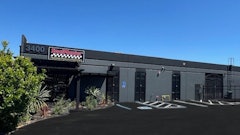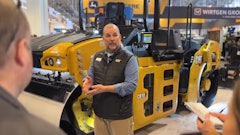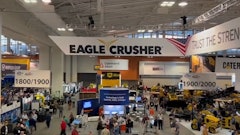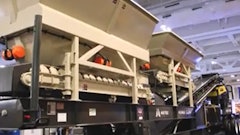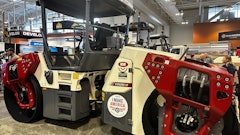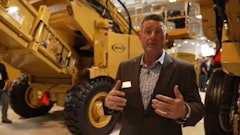Successful businesses frequently grow and evolve from surprisingly humble beginnings. Some of today's most notable companies and entrepreneurs serve as prime examples. Any number of factors can play a part in transforming an upstart operation into a flourishing corporation, but every success story seems to have one thing in common, the ability to find a specialized niche and to do it very well.
Few would guess from its name that Ace Asphalt of Arizona, Inc. was once a small Wisconsin pavement striping company called Parking Stripes, Inc. But that's precisely how the business began in 1966. Today Ace Asphalt's specialty is commercial paving, but even more unique is the broad repertoire of projects the company takes on. While Ace doesn't get involved with highway projects, almost everything else is fair game, from major site developments to small parking lot repairs.
Ace Asphalt's emphasis on commercial asphalt paving and other non-highway work would seem to indicate that it's the thing it does best. But its commitment to providing high-quality service for every customer, large or small, may be the real difference contributing to the company's continued success. It is also a sign that despite its growth, Ace hasn't abandoned its modest roots.
The company's journey from Wisconsin to Arizona was preceded by gradually increasing sales over time, followed by expanded service offerings, such as asphalt patching and seal coating. The most extraordinary step in company history occurred in 1981 when the local operations were sold and today's existing company was formed in Phoenix. To further capitalize on rapidly occurring growth in the state, a Tucson, Ariz., branch was later added, and the company began to provide earthwork and grading services as well.
With the aid of its 400 employees, Ace Asphalt completes 4,000 projects per year for total annual sales in excess of $80 million, making it the largest parking lot contractor in Arizona and one of the largest in the United States. Its project portfolio is diverse and impressive, ranging from random patching jobs to construction of the proving grounds for auto manufacturers DaimlerChrysler and Volvo.
The company's steady stream of projects puts increased demand on both crews and equipment to keep up with the workload. Since approximately 75-percent of Ace Asphalt's projects involve paving, its pavers see a lot of action. "One thing about our equipment is that it doesn't sit," said Tom Tuttle, the production general manager and 12-year veteran of Ace Asphalt.
Ace's fleet is composed primarily of commercial-class pavers, with a few highway-class machines on hand for wide-open heavy production areas. In recent years, Ace Asphalt looked in a new direction for their equipment needs, searching specifically for a machine that would be an ideal complement to the company's commercial paving specialty. When it came time for the company to add new pavers to its arsenal, Ace consulted with Road Machinery Co., a multi-state equipment distributor with its corporate headquarters in Phoenix. Road Machinery recommended that Ace Asphalt try out the new 814-2 mid-size self-propelled asphalt pavers from BOMAG.
"We checked out a company in town that was running a BOMAG paver," said Tuttle. "We were impressed, so we purchased a used 813 machine to try it out. We decided it was the way to go, and then we ordered three brand new 814-2 pavers." Ace's three new acquisitions were among the first of the model sold in the United States and brought the total number of pavers in Ace's fleet to 13.
With a standard paving width of 8 to 14 feet, the 814-2 was an ideal solution for the variety of commercial projects that Ace Asphalt performs. The company wasted no time in putting the BOMAG pavers to work, sending them to the construction site of the Mountain Vista Medical Center on a cleared stretch of desert terrain in Mesa, Ariz. Scheduled to open its doors in 2007, this new state-of-the-art, full-service hospital will hold 172 beds and have two connecting office buildings once completed.
Ace Asphalt was awarded a $6 million contract for the job and began work on the site in August of 2005. The company had to make use of all its talents on the project, since Ace was contracted to install the underground utilities, including the storm water and sewer systems, as well as to handle all the grading and balancing of the site.
Few projects for Ace Asphalt are complete without a paving component, and the medical center job was no different. Like many new building constructions, Mountain Vista needed a parking facility large enough to accommodate the sizeable volume of staff, patients and visitors certain to be frequenting the center on a daily basis.
Although the overall scale of the parking project was large, it was actually a conglomeration of several smaller parking lots. This meant that the individual areas to be paved could only be effectively handled with a commercial-class paver. And due to the ongoing construction of the hospital building itself, the project could not be completed in one fell swoop, but rather had to be broken into various phases.
The first phase of paving began in November of 2005, when Ace Asphalt's paving crew of seven employees brought the company's new 814-2 pavers to the job site. "We're typically running one or two of the BOMAG pavers at a time, depending on the area we have prepped," said Scott Phillips, Ace Asphalt's project manager for the Mountain Vista job.
Specifications for the paving portion of the project called for more than 20,000 tons of asphalt to be put down. Despite the nuances and tight fits of the areas to be paved, Ace was able to maintain its production goal of 500 tons per day on average. Because the 814-2 is only 12 feet long, the machine has the ability to pave its way into tight spaces, turn and pave its way out, all without stopping. "The BOMAG really allowed us to get into corners and pulled out the mat quite well," said Phillips.
With parking bays, light standards and other obstacles to negotiate, the maneuverability of the pavers was not only a welcome advantage for Ace Asphalt, but also a necessary one. The productivity of the BOMAG pavers also proved to be a valuable benefit. The 814-2 features an 85-horspower Cummins diesel engine, providing more power than typical commercial-class pavers. Additionally, a load-sensing hydraulic system on the machine only delivers power when necessary, making the paver as efficient as it is powerful.
"Normally we would use a compact paver to pull out parking bays and things of that nature, and then bring in the big paver to handle the roadways," said Tuttle. "But ever since we brought in the BOMAG's, we prefer to utilize them everywhere we can. In some instances we won't even start up the big machine or bring it to the job because it's simply more cost effective to run the 814."
Easier cleaning and maintenance of the machines is another factor that contributes to efficiency on the job. The design of the 814-2 enables the hopper bed to be raised to a clearance of six feet in only five minutes, allowing for quick, convenient cleaning when needed. According to Tuttle, other units that Ace has used take much longer to open up and still don't provide enough clearance for a thorough cleaning. The company must take these pavers to a shop, where the front end literally has to be taken apart before the machines can be cleaned.
"You can clean the pavers very easily," said Tuttle. "That was actually a complaint from our operators in the beginning because they suddenly had to do more cleaning themselves. But as far as what it means to the longevity of the unit and avoiding breakdowns, they really appreciate it now."
Thanks in part to the versatility of the pavers, Ace Asphalt has maintained its anticipated schedule throughout the various phases of the Mountain Vista project. The impressive results that the 814-2 has yielded for Ace even helped persuade the company to recently purchase three new BOMAG tandem-drum rollers.
Ace Asphalt's work on the hospital job will conclude when it paves the main ring running around the complex, a road that is remaining unpaved while a high volume of construction traffic continues to go in and out from the facility. Meanwhile, the new 814-2 pavers will have no trouble keeping busy as Ace's workload remains constant and strong.
"We've been very pleased with this machine," said Tuttle. "It outperforms our other compact pavers and lays a very nice mat. It can do just about anything our bigger machines can do while producing just as fine or an even better product than what we would get by switching back and forth between machines. And that's not even taking the cost savings into account."
Some at Ace Asphalt had always believed that the differences between various pavers on the market were insignificant, and that the operator was the one to make or break a paving operation. But Ace's recent purchases have proven that an already successful and prosperous company can still find ways to improve the bottom line, one parking lot at a time.






